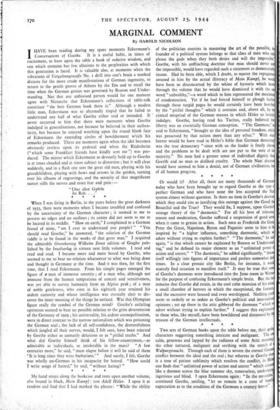Or would it? After all, there are many thousands of
Germain today who have been brought up to regard Goethe as the type d perfect German and who have none the less accepted the Nan system almost without question. Is there no item in Goethe's doctrine which they could cite as justifying this outrage against the Goocr, Beautiful and the True? They would fix, I suppose, upon Goethe strange theory of the "daemonic." For all his love of toleran reason and moderation, Goethe suffered a suspension of good when it came to genius in action. Such men as Frederick the Gr Peter the Great, Napoleon, Byron and Paganini seem to him to inspired by "a higher influence, something daemonic, which adore without trying to explain further." "The daemonic," he again, "is that which cannot be explained by Reason or Understan ing," and he defined its major element as an "unlimited power action and unrest." "The daemonic," he added significantly, " thrn itself willingly into figures of importance and prefers somewhat times. In a clear prosaic city like Berlin, for instance, it wo scarcely find occasion to manifest itself." At may be true that so of Goethe's daemons were introduced into the Juno room in We for the purpose of confusing Eckermann's simple brain. But the remains that Goethe did retain, in the cool calm mansion of his a small chamber of horrors in which the exceptional, the fantasu and the excessive- were housed and even worshipped. Nothing co seem so orderly or so sedate as Goethe's political and internation opinions ; yet up there in the attic gibbered the daemons "which adore without trying to explain further." I suggest this explanauo to those who, like myself,.have been bewildered and distressed by treason of the German intellectuals.


























 Previous page
Previous page